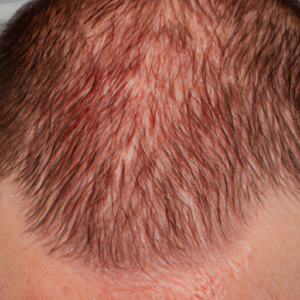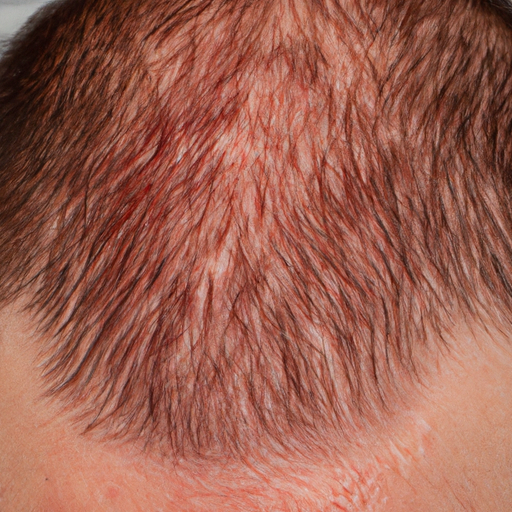Hey there. Scalp psoriasis is definitely a diagnosis that no one wants to hear, and it can be scary when you or someone you love is dealing with it. But luckily, there are some very effective methods of managing it. So let’s talk about what scalp psoriasis is and how you can deal with it.
Scalp psoriasis is a chronic autoimmune skin disorder. It affects people of all ages and can cause red, scaly patches to form on the scalp. This condition is quite common and affects an estimated 3% of all people worldwide.
It’s not easy to deal with scalp psoriasis, but it’s not impossible either. With the right treatment, you can get relief from the painful symptoms and even prevent the condition from getting worse. So don’t lose hope – let’s learn more about scalp psoriasis and how to manage it!
Symptoms of Scalp Psoriasis
When it comes to scalp psoriasis, it’s all about the telltale signs: dry scalp, redness, itching and white, flaky skin build-up. Sure, other conditions display similar symptoms – like seborrheic dermatitis and eczema – but psoriasis is really in a class of its own.
My advice? Pay extra attention to your scalp, be it through self-examinations or regular dermatologist visits. If anything looks out of the ordinary, you should act fast and look for professional help. That said, here are the most common early signs of scalp psoriasis:

If you notice any of these symptoms, you should seek medical advice as soon as possible. Ignoring scalp psoriasis can lead to painful flare-ups that could require more aggressive treatments.
Causes of Scalp Psoriasis
There’s a lot of mystery around why some people develop scalp psoriasis and not others, but research has suggested a few potential causes. The biggest one is genetics — if you have a family history of psoriasis, you’re more likely to get the condition.
It could also be an immune system malfunction — when your body’s defenses go haywire and start attacking itself instead of protecting you from infection. This can trigger inflammation in your skin and lead to scalp psoriasis.
Stress plays a big role, too. Those moments of emotional or physical stress can really take their toll on your body, causing flare-ups that can last for weeks.
Certain environmental factors can also bring on scalp psoriasis; stuff like sudden weather changes, smoke and pollution, and even certain foods and drinks, like alcohol and spicy food.
Infections, trauma, and hormonal shifts can also turn on the psoriasis switch, so it’s important to keep track of any shifts in your lifestyle that might set off a reaction. But regardless of what causes your scalp psoriasis, you can still find ways to manage the condition.
Diagnosing Scalp Psoriasis
When it comes to diagnosing scalp psoriasis, the first step is to visit your doctor. They’ll be able to take a look and get the ball rolling, as well as recommending any necessary tests that you may need. It can also help to have a chat about any family history of skin conditions, as this could give your doctor or dermatologist an even better idea of what’s going on.
It may be worth keeping a diary of how often your scalp flares up and when. This will give your doc vital information when it comes to ruling out other skin conditions and making the diagnosis. And don’t forget to mention if there’s been any recent changes in your lifestyle, too – anything from switching up your beauty products to taking more stress than usual.
If your physician suspects it’s scalp psoriasis, they may want to do a biopsy. This involves taking a small sample of the affected area and sending it off for further testing in a lab. It sounds scary, but it’s actually very common, so don’t sweat it!
Your doctor might also come at it from another angle, using a Wood’s Light (which is basically a special fluorescent light that helps diagnose diseases and infections of the skin).
Ultimately, the key takeaway here is that proper and timely diagnosis is paramount when it comes to treating scalp psoriasis, so don’t be afraid to reach out for help. Your doc just might be able to get you back on track with no time!
Treatment Options for Scalp Psoriasis
When it comes to treating Scalp Psoriasis, the word of the day is “patience.” That’s because finding a suitable treatment plan can be tricky. You may have to try different options before you get relief from your symptoms.
The first line of defense is typically topical ointments and creams that contain corticosteroids, coal tar, retinoids, salicylic acid, or vitamin D. These medications help reduce inflammation and itchiness, while making your condition more manageable. Talk with your doctor about which product might work best for you.
But if topical products aren’t cutting it, phototherapy—exposing the affected area to ultraviolet light—may also be an option. Your dermatologist may also prescribe oral medication, systemic therapy, and biologic drugs, among other treatments. Keep in mind, though, that each approach comes with its own set of risks and side effects.
It’s also a good idea to adopt some habits that can help manage your condition. Things like limiting stress, eating a nutritious diet, reducing your exposure to triggers that make your psoriasis worse, and using humidifiers can go a long way. Combine these changes with a course of treatment recommended by your doctor, and you’ll be well on your way to success!
Prevention Strategies for Scalp Psoriasis
Living with scalp psoriasis can be challenging and frustrating, so it’s always best to take steps to prevent flare-ups in the first place. Here are a few ideas to keep your scalp healthy and happy:
Avoid stress. Easier said than done, sure, but try your best to stay away from high-pressure situations that could cause stress. It’s no secret that stress is one of the biggest triggers of scalp psoriasis flare-ups.
Be mindful of what you put on your scalp. Certain hair products and dyes can irritate an already tender scalp, so be sure to read the ingredient lists and avoid anything that contains harsh chemicals.
Take care of your skin. Keeping your scalp moisturized with natural oils is essential for preventing psoriasis from worsening. Avoid long, hot showers or baths, as they can strip away natural oils from your skin and make it more prone to irritation.
Eat a balanced diet. Fill your plate with plenty of fresh fruits and vegetables, lean proteins, and healthy fats – these foods will help keep inflammation at bay. It’s also important to limit sugar and processed foods, which can worsen systemic inflammation.
Exercise regularly. Exercise has been shown to reduce stress levels, improve sleep quality, and even lower inflammation – all of which can help prevent psoriasis flare-ups. Furthermore, regular exercise can help boost your overall mood, which can positively impact the physical symptoms of psoriasis.
See your doctor regularly. If you’re struggling to manage your psoriasis symptoms, make sure to schedule regular appointments with your doctor to discuss any changes and come up with a treatment plan that works best for you. Your doctor will most likely advise lifestyle changes such as quitting smoking and/or drinking alcohol, as well as recommending specific treatments that might help control your condition.
By taking proactive steps to manage your stress levels, being mindful of what you put on your scalp, taking good care of your skin, eating a balanced diet, exercising regularly, and seeing your doctor on a regular basis, you can greatly reduce the severity of your scalp psoriasis and hopefully even prevent flare-ups altogether!
Conclusion
It’s important to remember that scalp psoriasis is both manageable and preventable. With the help of knowledgeable health care providers, lifestyle changes, and effective treatments, this condition can be kept under control. There are a variety of treatment options available, depending on the severity and how your body responds. Prevention strategies such as maintaining good hygiene, moisturizing the scalp, and avoiding triggers can all help reduce flare-ups. The bottom line is, scalp psoriasis can be uncomfortable, but it doesn’t have to rule your life!
FAQ About Scalp Psoriasis
How I cured my psoriasis on scalp?
After struggling with scalp psoriasis for years, I finally figured out the secret to curing it. It all started when I decided to go back to basics and break down what I was doing and how I was treating my scalp psoriasis. I came to the conclusion that the problem was twofold: poor hygiene and a poor diet.
I soon realized my scalp was dirty and full of build-up, so I started deep cleaning it regularly by giving it steam massages, using special shampoos, and making sure I never shampooed too much. Then, I changed my diet to include more healthy fats like olive oil and avocado, and cut out processed foods, sugars and refined flours. Plus, I made sure to get lots of vitamins and minerals from fruits and vegetables.
Finally, I took a more holistic approach to treating my scalp psoriasis by drinking more water, taking probiotics, and finding healthy ways to help manage stress. After all this, my scalp psoriasis cleared up wonderfully, and I haven’t had any issues since then!
What is psoriasis overview and diagnosis?
Psoriasis is a skin condition that causes red and scaly patches to appear on various body parts. It’s a common condition, affecting more than 8 million people in the United States. Scalp psoriasis, which is psoriasis that affects the skin on the scalp, is one of the most common types of psoriasis.
When it comes to diagnosing scalp psoriasis, a doctor or dermatologist will generally start by asking about your medical history and examining your skin. They may also take a skin sample or a biopsy, to help make an accurate diagnosis. In some cases, they may also do a blood test in order to rule out other potential causes of the symptoms. If other skin conditions such as seborrheic dermatitis or fungal infection are suspected, they may take a culture or perform an imaging study such as an X-ray or ultrasounds.
It’s important to know that scalp psoriasis can’t be cured, but it can be managed with the right treatment plan. Treatment may include topical medications, such as ointments, creams, and shampoos, ultraviolet light therapy, and oral medications. Some people may also find lifestyle changes beneficial, such as avoiding triggers, such as stress and certain foods and drinks, and managing stress through relaxation exercises and regular exercise.
What does psoriasis look like on scalp?
Psoriasis on the scalp can look like thick, red patches of skin covered with flaky white scales that appear to be stuck to the scalp. It can cause itching, burning, and mild to severe discomfort. The areas can be painful to the touch and may even start to bleed if scratched. In some cases, it can also cause hair loss.
My advice for those living with scalp psoriasis is to be very gentle when grooming and styling the hair, as brushing and combing can be quite irritating. Avoid using hot styling tools and harsh products, as they will irritate the scalp even more. Be sure to use products that are designed specifically for psoriasis, as they will help to keep the area moisturized. For extra relief, an ice-pack or a cool washcloth can be applied to the area – this will offer temporary relief from the itching and burning.
For those looking to manage their scalp psoriasis long-term, I recommend speaking to a dermatologist. They will be able to offer tailored advice and treatments that can help reduce the symptoms and keep the condition under control.
